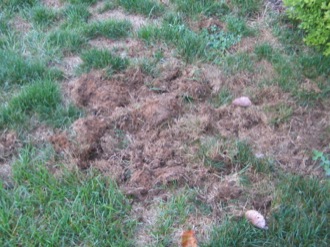My Lawn ‘Stinks’: Skunk Damage
Did you wake up one morning in early fall, take a look at your lawn, and think that somebody must have vandalized it with a shovel? You probably received a visit from a skunk or a raccoon.

White grubs are a common pest in cool-season lawns in Virginia because they feed on our lawn’s root system during periods when turfgrass growth can be greatly slowed by extremes in temperature and/or moisture. Therefore, most recommendations for white grub control with widely available grubicides for Virginia’s cool-season lawns recommend insecticide applications from mid-July to mid-August. (Note that newly emerging chemistries are touting and doing a pretty good job of delivering ‘season-long’ control, so pay attention to updates in labeled chemistry for grub control). The application timing for our standard insecticides is all about controlling grubs when they are at their youngest, most vulnerable stage of development. This strategy is still appropriate year-in, year-out. However, what often happens is that lawns that received no grubicide treatment AND were free from visible damage during the summer can suddenly be decimated in short fashion by a night-time visit by a skunk or a raccoon. These four-legged pests are foraging for some tasty 3rd instar grubs as a high protein meal and they can destroy several square feet of sod in just a matter of hours. If you have a history of skunk or raccoon damage or know that you have a healthy population of white grubs under your turf canopy from working in your yard, this can be a good reason to apply a grubicide either as soon as you see this type of damage in early fall OR as a preventive application earlier in the summer. I speak from personal experience with this problem as my lawn in Blacksburg was decimated for consecutive years by foraging skunks before I began making a preventive grubicide application in mid-August. Since taking the preventive approach, there has been no skunk activity in my lawn.
Dr. Rod Youngman, Extension Entomologist at Virginia Tech, has a thorough discussion of products and strategies in insect control in the lawn and landscape that can be found in the Virginia Cooperative Extension Pest Management Guide for Home Grounds and Animals (pubs.ext.vt.edu). Be sure to check this and other publications that will provide you tips on how to keep your lawn green and our water resources clean at this website. And remember that your local extension office is a great resource for information specific to your area.


